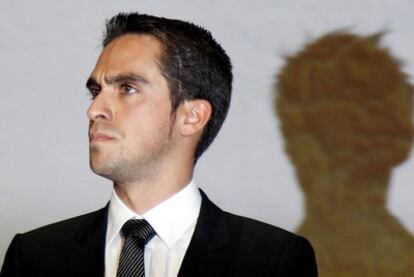Contador and the lie detector
The cyclist's clenbuterol case hearing will involve 23 witnesses and experts
Gorka Villar, the lawyer coordinating Alberto Contador's legal team, said in Madrid recently that the hearing before the Court of Arbitration for Sport simply consists of convincing the three arbitrators that its thesis for the cyclist's positive doping test at the 2010 Tour de France is the most plausible. "The decision will be made on the balance of probabilities," Villar said. "If the arbitrators believe your thesis has a 51-percent probability of having occurred, you have won."
Of course, it won't be quite that simple. The other side, made up of the World Anti-Doping Agency (WADA) and the International Cycling Union (UCI), will be presenting several other possibilities to explain the fact that 50 picograms of clenbuterol showed up in a test of the urine of the Madrileño cyclist in an anti-doping test taken during last year's Tour.
Scheduled to take place before the CAS from November 21 to 24, the appeal lodged by WADA and the UCI against Contador and the Spanish Cycling Federation ? which considered the cyclist should not by punished for his positive clenbuterol test ? will be genuinely complex. No fewer than 23 people, 10 for the appeal and 13 for Contador's side, will appear as witnesses or experts.
In order to show that it was a piece of contaminated meat that caused the problem, Contador is likely to declare, probably on Tuesday 22nd, that he and his teammates ? Benjamín Noval, Jesús Hernández and Paolo Tiralongo ? ate the same meat during a Tour rest day in Pau.
Mike Morgan, the British lawyer who will present the case ? one of four defending the Spanish cyclist ? will be supported by two experts who are no strangers to the CAS: the venerable Vivian James, an 87-year-old Briton who worked for the UK's anti-doping agency, and Paul Scott, a Californian who had a business dedicated to carrying out internal doping tests within cycling teams. Contador's scientific team has replaced Italian hematologist Giuseppe Banfi, whose report was key to the case heard at the Spanish federation, by a German plasticizers expert ? in case WADA use the high level of plasticizers discovered in Contador as an indirect indication of blood manipulation ? and a British biostatistician who will try to call the value of biological passports into question. Contador will also bring in a private detective who tried to trace the origins of the sirloin steak under suspicion, supposedly acquired in Irún, and a Civil Guard officer. But perhaps the most curious character will be Louis Rovner, an American lie-detection expert. His presence suggests that one of the pieces of evidence that Contador will present to prove his innocence will be a polygraph test.
The WADA, which will bear the full burden of the accusation, even though the UCI is supporting it with a Spanish lawyer, will attempt, on the one hand, to demonstrate that in Spain it is very unlikely that a piece of contaminated meat would reach a consumer ? for that it will call upon the butcher who sold the meat to testify and the head of the Spanish association of cattle farmers. On the other hand, it will try to upset the balance of probabilities in its favor by presenting other plausible theses: principally that the cyclist's biological passport suggests blood manipulation ? a transfusion of plasma that contained traces of clenbuterol previously ingested. To do that, the WADA will call upon experts such as Australian Michael Ashenden; Olivier Rabin, WADA's scientific director; and Pierre Sottas, one of the inventors of the biological passport. Using pharmacokinetics experts, it will also try to prove that even if the meat had been contaminated with clenbuterol, Contador would have had to ingest a very large quantity for it to appear in his urine.
The stage is set for the biggest sports trial ever held, with the honor of the best cyclist currently in the world at stake. It will be a formidable and passionate legal-scientific duel.

Tu suscripción se está usando en otro dispositivo
¿Quieres añadir otro usuario a tu suscripción?
Si continúas leyendo en este dispositivo, no se podrá leer en el otro.
FlechaTu suscripción se está usando en otro dispositivo y solo puedes acceder a EL PAÍS desde un dispositivo a la vez.
Si quieres compartir tu cuenta, cambia tu suscripción a la modalidad Premium, así podrás añadir otro usuario. Cada uno accederá con su propia cuenta de email, lo que os permitirá personalizar vuestra experiencia en EL PAÍS.
¿Tienes una suscripción de empresa? Accede aquí para contratar más cuentas.
En el caso de no saber quién está usando tu cuenta, te recomendamos cambiar tu contraseña aquí.
Si decides continuar compartiendo tu cuenta, este mensaje se mostrará en tu dispositivo y en el de la otra persona que está usando tu cuenta de forma indefinida, afectando a tu experiencia de lectura. Puedes consultar aquí los términos y condiciones de la suscripción digital.








































